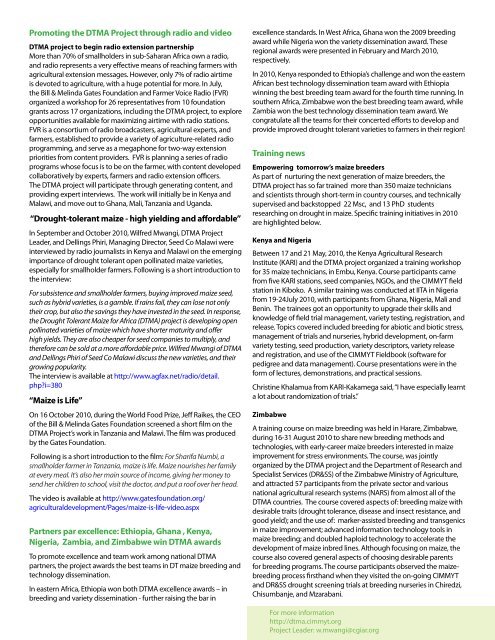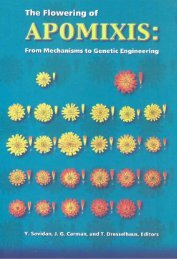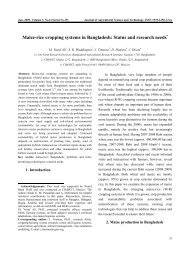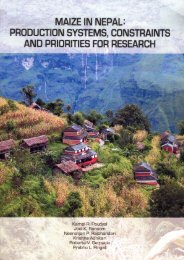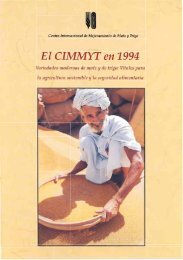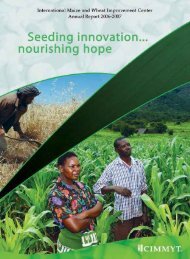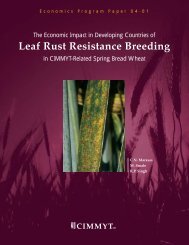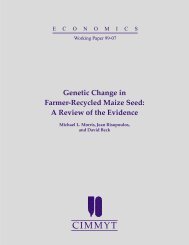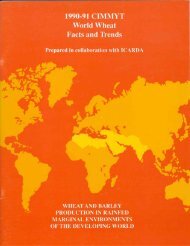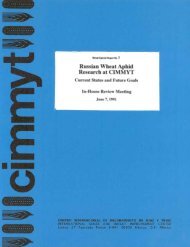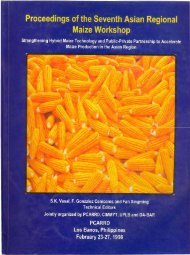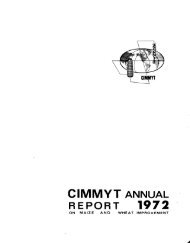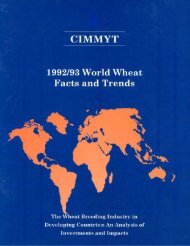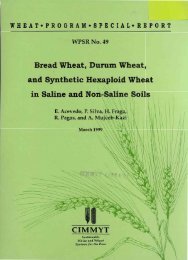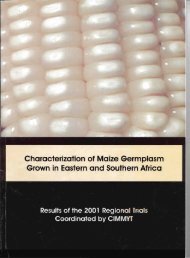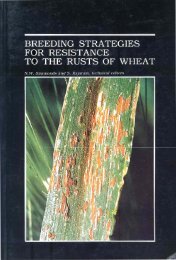Drought-tolerant maize for Africa: Better food security and ... - cimmyt
Drought-tolerant maize for Africa: Better food security and ... - cimmyt
Drought-tolerant maize for Africa: Better food security and ... - cimmyt
You also want an ePaper? Increase the reach of your titles
YUMPU automatically turns print PDFs into web optimized ePapers that Google loves.
Promoting the DTMA Project through radio <strong>and</strong> video<br />
DTMA project to begin radio extension partnership<br />
More than 70% of smallholders in sub-Saharan <strong>Africa</strong> own a radio,<br />
<strong>and</strong> radio represents a very effective means of reaching farmers with<br />
agricultural extension messages. However, only 7% of radio airtime<br />
is devoted to agriculture, with a huge potential <strong>for</strong> more. In July,<br />
the Bill & Melinda Gates Foundation <strong>and</strong> Farmer Voice Radio (FVR)<br />
organized a workshop <strong>for</strong> 26 representatives from 10 foundation<br />
grants across 17 organizations, including the DTMA project, to explore<br />
opportunities available <strong>for</strong> maximizing airtime with radio stations.<br />
FVR is a consortium of radio broadcasters, agricultural experts, <strong>and</strong><br />
farmers, established to provide a variety of agriculture-related radio<br />
programming, <strong>and</strong> serve as a megaphone <strong>for</strong> two-way extension<br />
priorities from content providers. FVR is planning a series of radio<br />
programs whose focus is to be on the farmer, with content developed<br />
collaboratively by experts, farmers <strong>and</strong> radio extension officers.<br />
The DTMA project will participate through generating content, <strong>and</strong><br />
providing expert interviews. The work will initially be in Kenya <strong>and</strong><br />
Malawi, <strong>and</strong> move out to Ghana, Mali, Tanzania <strong>and</strong> Ug<strong>and</strong>a.<br />
“<strong>Drought</strong>-<strong>tolerant</strong> <strong>maize</strong> - high yielding <strong>and</strong> af<strong>for</strong>dable”<br />
In September <strong>and</strong> October 2010, Wilfred Mwangi, DTMA Project<br />
Leader, <strong>and</strong> Dellings Phiri, Managing Director, Seed Co Malawi were<br />
interviewed by radio journalists in Kenya <strong>and</strong> Malawi on the emerging<br />
importance of drought <strong>tolerant</strong> open pollinated <strong>maize</strong> varieties,<br />
especially <strong>for</strong> smallholder farmers. Following is a short introduction to<br />
the interview:<br />
For subsistence <strong>and</strong> smallholder farmers, buying improved <strong>maize</strong> seed,<br />
such as hybrid varieties, is a gamble. If rains fail, they can lose not only<br />
their crop, but also the savings they have invested in the seed. In response,<br />
the <strong>Drought</strong> Tolerant Maize <strong>for</strong> <strong>Africa</strong> (DTMA) project is developing open<br />
pollinated varieties of <strong>maize</strong> which have shorter maturity <strong>and</strong> offer<br />
high yields. They are also cheaper <strong>for</strong> seed companies to multiply, <strong>and</strong><br />
there<strong>for</strong>e can be sold at a more af<strong>for</strong>dable price. Wilfred Mwangi of DTMA<br />
<strong>and</strong> Dellings Phiri of Seed Co Malawi discuss the new varieties, <strong>and</strong> their<br />
growing popularity.<br />
The interview is available at http://www.agfax.net/radio/detail.<br />
php?i=380<br />
“Maize is Life”<br />
On 16 October 2010, during the World Food Prize, Jeff Raikes, the CEO<br />
of the Bill & Melinda Gates Foundation screened a short film on the<br />
DTMA Project’s work in Tanzania <strong>and</strong> Malawi. The film was produced<br />
by the Gates Foundation.<br />
Following is a short introduction to the film: For Sharifa Numbi, a<br />
smallholder farmer in Tanzania, <strong>maize</strong> is life. Maize nourishes her family<br />
at every meal. It’s also her main source of income, giving her money to<br />
send her children to school, visit the doctor, <strong>and</strong> put a roof over her head.<br />
The video is available at http://www.gatesfoundation.org/<br />
agriculturaldevelopment/Pages/<strong>maize</strong>-is-life-video.aspx<br />
Partners par excellence: Ethiopia, Ghana , Kenya,<br />
Nigeria, Zambia, <strong>and</strong> Zimbabwe win DTMA awards<br />
To promote excellence <strong>and</strong> team work among national DTMA<br />
partners, the project awards the best teams in DT <strong>maize</strong> breeding <strong>and</strong><br />
technology dissemination.<br />
In eastern <strong>Africa</strong>, Ethiopia won both DTMA excellence awards – in<br />
breeding <strong>and</strong> variety dissemination - further raising the bar in<br />
excellence st<strong>and</strong>ards. In West <strong>Africa</strong>, Ghana won the 2009 breeding<br />
award while Nigeria won the variety dissemination award. These<br />
regional awards were presented in February <strong>and</strong> March 2010,<br />
respectively.<br />
In 2010, Kenya responded to Ethiopia’s challenge <strong>and</strong> won the eastern<br />
<strong>Africa</strong>n best technology dissemination team award with Ethiopia<br />
winning the best breeding team award <strong>for</strong> the fourth time running. In<br />
southern <strong>Africa</strong>, Zimbabwe won the best breeding team award, while<br />
Zambia won the best technology dissemination team award. We<br />
congratulate all the teams <strong>for</strong> their concerted ef<strong>for</strong>ts to develop <strong>and</strong><br />
provide improved drought <strong>tolerant</strong> varieties to farmers in their region!<br />
Training news<br />
Empowering tomorrow’s <strong>maize</strong> breeders<br />
As part of nurturing the next generation of <strong>maize</strong> breeders, the<br />
DTMA project has so far trained more than 350 <strong>maize</strong> technicians<br />
<strong>and</strong> scientists through short-term in country courses, <strong>and</strong> technically<br />
supervised <strong>and</strong> backstopped 22 Msc, <strong>and</strong> 13 PhD students<br />
researching on drought in <strong>maize</strong>. Specific training initiatives in 2010<br />
are highlighted below.<br />
Kenya <strong>and</strong> Nigeria<br />
Between 17 <strong>and</strong> 21 May, 2010, the Kenya Agricultural Research<br />
Institute (KARI) <strong>and</strong> the DTMA project organized a training workshop<br />
<strong>for</strong> 35 <strong>maize</strong> technicians, in Embu, Kenya. Course participants came<br />
from five KARI stations, seed companies, NGOs, <strong>and</strong> the CIMMYT field<br />
station in Kiboko. A similar training was conducted at IITA in Nigeria<br />
from 19-24July 2010, with participants from Ghana, Nigeria, Mali <strong>and</strong><br />
Benin. The trainees got an opportunity to upgrade their skills <strong>and</strong><br />
knowledge of field trial management, variety testing, registration, <strong>and</strong><br />
release. Topics covered included breeding <strong>for</strong> abiotic <strong>and</strong> biotic stress,<br />
management of trials <strong>and</strong> nurseries, hybrid development, on-farm<br />
variety testing, seed production, variety descriptors, variety release<br />
<strong>and</strong> registration, <strong>and</strong> use of the CIMMYT Fieldbook (software <strong>for</strong><br />
pedigree <strong>and</strong> data management). Course presentations were in the<br />
<strong>for</strong>m of lectures, demonstrations, <strong>and</strong> practical sessions.<br />
Christine Khalamua from KARI-Kakamega said, “I have especially learnt<br />
a lot about r<strong>and</strong>omization of trials.”<br />
Zimbabwe<br />
A training course on <strong>maize</strong> breeding was held in Harare, Zimbabwe,<br />
during 16-31 August 2010 to share new breeding methods <strong>and</strong><br />
technologies, with early-career <strong>maize</strong> breeders interested in <strong>maize</strong><br />
improvement <strong>for</strong> stress environments. The course, was jointly<br />
organized by the DTMA project <strong>and</strong> the Department of Research <strong>and</strong><br />
Specialist Services (DR&SS) of the Zimbabwe Ministry of Agriculture,<br />
<strong>and</strong> attracted 57 participants from the private sector <strong>and</strong> various<br />
national agricultural research systems (NARS) from almost all of the<br />
DTMA countries. The course covered aspects of: breeding <strong>maize</strong> with<br />
desirable traits (drought tolerance, disease <strong>and</strong> insect resistance, <strong>and</strong><br />
good yield); <strong>and</strong> the use of: marker-assisted breeding <strong>and</strong> transgenics<br />
in <strong>maize</strong> improvement; advanced in<strong>for</strong>mation technology tools in<br />
<strong>maize</strong> breeding; <strong>and</strong> doubled haploid technology to accelerate the<br />
development of <strong>maize</strong> inbred lines. Although focusing on <strong>maize</strong>, the<br />
course also covered general aspects of choosing desirable parents<br />
<strong>for</strong> breeding programs. The course participants observed the <strong>maize</strong>breeding<br />
process firsth<strong>and</strong> when they visited the on-going CIMMYT<br />
<strong>and</strong> DR&SS drought screening trials at breeding nurseries in Chiredzi,<br />
Chisumbanje, <strong>and</strong> Mzarabani.<br />
For more in<strong>for</strong>mation<br />
http://dtma.<strong>cimmyt</strong>.org<br />
Project Leader: w.mwangi@cgiar.org


